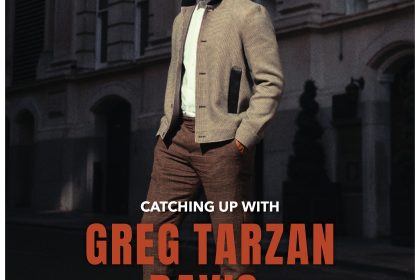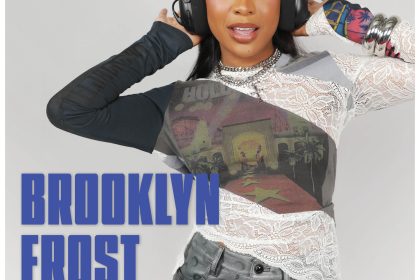Words
by Todd Williams
Images by Grace Kisa for Steed Media Service
Styled by Darryl Brown
As
an actor, Terrence Howard has a brooding intensity that has served him
well in his decade and a half on the big screen. His fiery glare and
menacing sneer as Cowboy in 1995’s Dead Presidents turned what could’ve
been an incidental secondary role into his breakthrough. Howard’s
complex and conflicted portrayal of pimp-turned-rapper DJay in 2005’s
Hustle & Flow netted the remarkable talent an Oscar® nomination.
But that trademark intensity on-screen is but one by-product of an
artist who’s driven by a passion for life and an unwavering search for
the truth.
 |
Today,
his journey has brought him to Sony headquarters in Manhattan, and he’s
in a good mood. “Where’s my guitar?” he asks to no one in particular as
his eyes scan the room. While waiting for his next wardrobe change for
the photo shoot, Howard picks up his acoustic guitar and begins
plucking the intro to “Spanish Love Affair,” a song from his debut
album, Shine Through It.
Howard has
crafted an album that is musically and lyrically uninhibited — a
testament to his newfound piece of mind and self-knowledge. For the
actor-turned-artist, the process proved to be cathartic. “I can’t say
[that] I did it,” he says, his voice tinged with an undercurrent of
disbelief. “It’s like all those songs just poured through me and those
musicians did everything I wanted them to do — with just me dancing in
front of them, or with just my nod, or with just a slight look, [and]
it came together. Almost like angels were orchestrating it and I just
had to show up and be open.”
Cynics tend
to scoff whenever an entertainer decides to venture into a field other
than the one they first came to prominence in. Once the media catches a
vocalist reading for parts or discovers a talented actor moonlighting
in a band, the typical reaction is one of bemusement, quickly followed
by dismissal. But Howard’s love affair with song runs deeper than the
average actor-turned-singer vanity project. His original motivation for
leaving his native Cleveland, Ohio and heading west to Los Angeles was
his desire to record. His audition for the 1992 television mini-series
“The Jacksons: An American Dream” was at least partially inspired by
his hopes of launching a recording career.
“I
came up there ‘cause I had this really pretty, high-pitched voice — I
used to sound like Bread or DeBarge before cigarettes,” he says with a
laugh. “But I came in and met with Suzanne De Passe because I knew that
the Jacksons were actually producing it.”
The
eager, young actor was hoping to impress the First Family of Music and
land a record deal. “I was like ‘I could get on set and I could sing
for Jackie [or] I could sing for Michael,’ ” he explains. “I was
writing these songs … but I didn’t know how to play an instrument, [so]
they put me in the movie and I sang a couple of songs for them, and
somebody put me with a producer — and he tried to bastardize my sound.”
The restrictive environment of his first studio experience would be a
blessing-in-disguise for the aspiring star; it would force him to
become self-reliant. “I thought then, at 20 years old, that I would
have to basically learn how to play all those instruments so I could do
it myself because these people couldn‘t get it.”
Howard’s
greatest gift as an artist, whether on-screen or onstage, has been his
willingness to remain open. But it wasn’t something that the
39-year-old always knew how to tap into. It took years for him to gain
that self-awareness. “Oftentimes we get in our own way — [and] we get
in God’s way,” says Howard. “God is forever trying to help us down a
path and He keeps telling us to be humble, so we don’t trip over
ourselves. If we’re humble, He’s able to move us and we can go wherever
He needs us to go.”
Howard and his band
recorded and arranged the album in less than a week, and each song on
the album is essentially a live performance. “It’s like the way the
true God made the world in six days,” he says. “This album … was almost
called Six Days to Sanctuary.”
 |
Howard
was moved to create the album after hearing singer-songwriter Ilsey
Juber of Los Angeles. Juber is the best friend of Howard’s … Flow
co-star, Taryn Manning, and the daughter of former Wings guitarist
Laurence Juber. Motivated to get her signed, Howard was turned down by
the labels when he approached them with the youngster, but they did
offer to give him a deal instead. He decided to use his album and name
as a launching pad for Juber, with whom he co-wrote the lead single,
“Sanctuary.”
“When we write together,
we bring the lines out of each other and we bring the melodies out of
each other,” says Juber. “It’s magic when you collaborate; we’re able
to go to another place.” Howard agrees that he and Juber had a strong
musical bond. “Ilsey came in [and we] let it take off,” he says of his
collaborating with the gifted young artist. “Now, I could’ve been a
megalomaniac — ‘no, I want it like this’ — but we wouldn’t be here.”
In
writing songs, Terrence Howard had to take a long, hard look at
Terrence Howard; and the singer-songwriter became a better man after
that introspective examination. “I’m no longer a character — I had to
see who I am,” he shares. “I had to [hear] the raspiness in my voice, I
had to see the raspiness in my nature … and I had to find my way out of
it — I had to find [a] way to be the best person I could [be.]”
Soon,
Howard began to break free of his admitted ‘raspiness,’ and found his
voice as a writer. “Now, I feel naked,” he says. “You can [listen to]
the album and know what happened between me and my wife, you could know
what the little boy in me dreamed about, you could know how I would
[romance] a woman if I was to talk to her. I’m completely naked now —
in front of the entire world. Before, I hid behind characters.”
Howard’s
music has been able to grow because of the songwriter’s commitment to
the process, and he’s found inspiration in every aspect of the world
around him. The stomping final track, “War,” was created after an
argument between Howard and co-producer/bassist Miles Mosley — almost
spontaneously. The coda for “Love Makes You Beautiful” is Howard and
his daughter reciting Corinthians I over the phone to each other. “To
me, teaching my child about the truth was beautiful and that’s what
will lead us into a more beautiful place,” he explains.
Creatively,
Howard found kindred spirits to draw inspiration from, not only giants
of biblical history such as David, but in his contemporaries — some of
whom burned out too soon. He views those casualties as a window into
how commitment to one’s art can take a dark turn. “Look at Heath
Ledger’s performance in [The Dark Knight],” Howard says. “[It] broke my
heart because I saw how sad he had to become in order to become that
indifferent to life [as the Joker]. He had to push his life away — he
had to. He had to lose every reason to be alive [till] death was a
beautiful option.” He pauses for a moment, visibly saddened by Ledger’s
tragic fate. “If he hadn’t had that terrible moment, he would’ve worked
things out with [his wife] Michelle [Williams] — they would’ve been all
right.”
While Howard notes the tragedy in
that side of creativity, he also acknowledges the commitment. “It’s
about how much you give — [was] it ‘a lot’ or everything? The
difference between the two means success or failure,” he says.
Since
he began showcasing his material in live shows, he’s had to continue to
push himself out of his shell. “My first couple of shows, I tried to
‘perform,’ ” explains Howard. “[I] can’t perform. A performance is
always a lie, it’s always deception. I used to think, as an actor,
[that] the better liar is the better actor. [But] it’s looking for the
truth and then sticking to it, no matter how loud or how quiet it may
be.” For Howard, now the essence of the stage is sharing an experience
with the audience, and having them connect with what he’s trying to
say. “I pray before I go out there ‘please, please, please listen to
this message,’ ” he says.
There’s one
song in particular he hopes that listeners receive, a mantra for the
singer-actor whenever he feels weakened by the temptations and
pressures of fame. “I make [the audience] sing ‘Shine Through It’ with
me,” he says. “I’m in love with this wonderful woman right now, [but]
there’s always a ton of girls trying to find their way to me, [so] the
one thing I say to myself is ‘shine through it.’ I remind [the
audience] when they talk to their friends and [they’re] going through
something, no matter what it is, just ‘shine through it.’ ”
That
has become a mantra for the actor. “It’s my medicine and it’s helping
because I was out of control,” he shares. “Now, I found that I can make
a commitment moment-by-moment. It’s making me a [godlier] person. When
I want a cigarette, I say to myself ‘shine through it.’ ”
And
he continues on his path of self-realization, convinced that he is in
touch with a higher purpose — and a higher power. “I made sure that the
message [in my music] would be clear for anybody in the world to hear,”
he says, before pausing again. “If Jesus came to visit me today, would
I have to turn my music off? Would I have to fast-forward through any
of my songs? No. I can sit right next to Him and expect to see Him
smile at His child and say, ‘[you] did all right — for a little dummy.’
”










